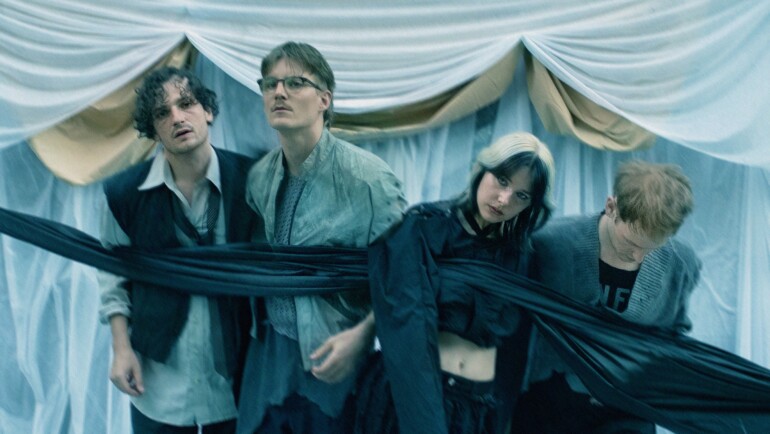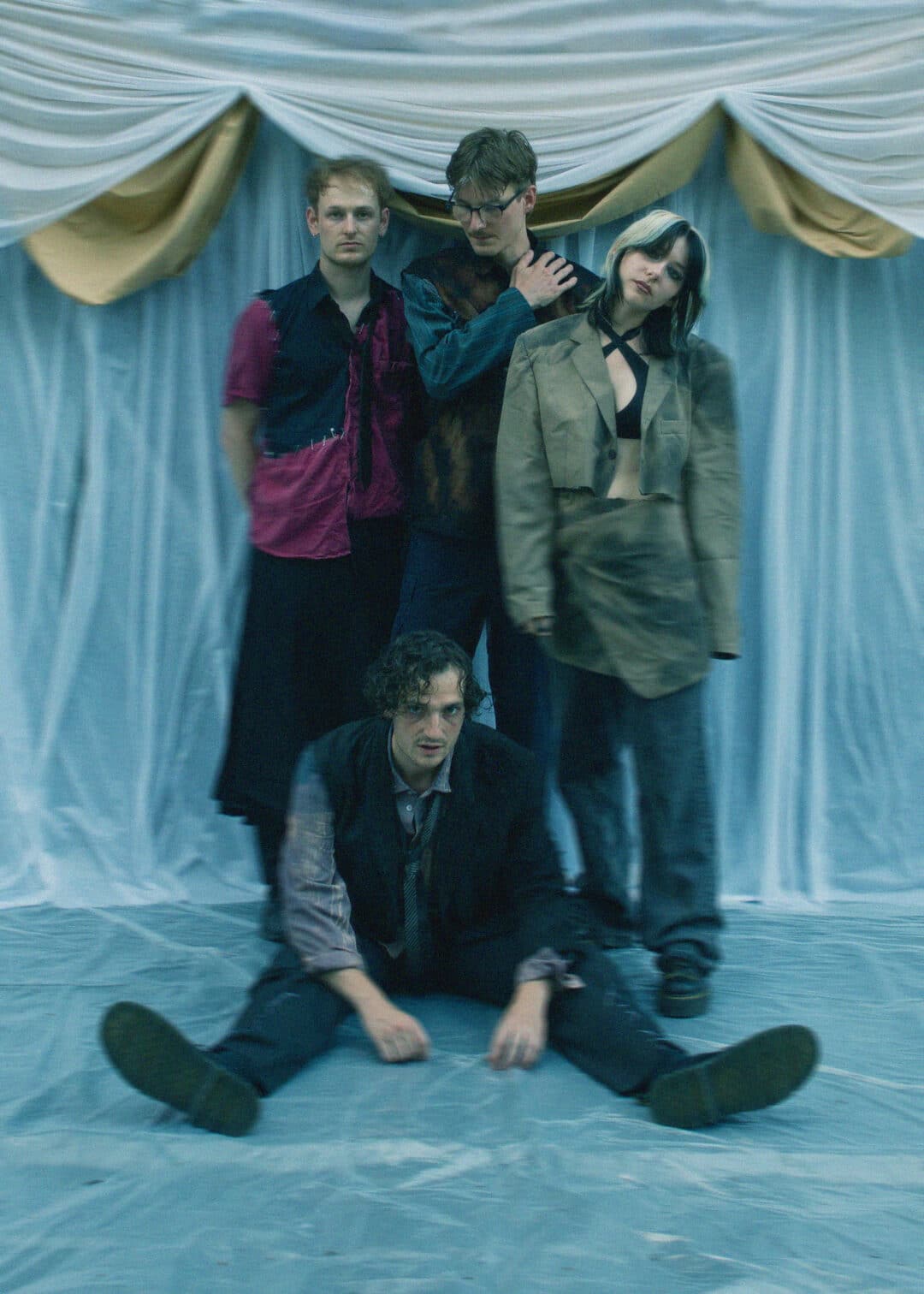
The Viennese quartet CULK recently released their third album, Generation Maximum, on Siluh Records. They may not be able to save the world, but the band does its best to leaven the hopelessness of an entire generation with a glimmer of light at the end of the tunnel. Katharina Reiffenstuhl talked with singer Sophie Löw and guitarist Johannes Blindhofer about performance pressure in the music business, the impossibility of escaping social media, and the gradual decay of society.
It’s the beginning of a new year – how optimistic is CULK?
Johannes Blindhofer: As a band, very. We’re looking forward to the concerts in February.
Sophie Löw: It’s always nice when the album is finished and you can just sit back and enjoy it for a while before moving on.
The new album deals with a lot of unpleasant realities and negativity. Can you draw hope from it at the end of the day?
Sophie Löw: The music always has something positive, at least for me. When we transform our concerns about the future into a song, the result is always something beautiful. We released our second album before the pandemic, and a number of people said that our music helped them get through the lockdowns. Some people only listen to happy music when they’re down, and then there are people who really confront the feelings and draw power from them. Because you can release them that way.
What kind of people are the two of you?
Johannes Blindhofer: I’m definitely the second type. Collectively experiencing things that worry or bother you, with other people is one of the best things about a live concert. When the lyrics echo through a room wit a few hundred people in it and everyone experiences it at the same time, it’s such a great feeling of community.
Sophie Löw: I’m both.
Somehow you still manage to make the songs sound surprisingly reassuring.
Johannes Blindhofer: I think we try to deal with certain issues in a way that’s not clichéd or melodramatic. It’s easy to go into a tailspin, but I think it’s important that music have these contradictory elements to break up the pattern sometimes. Opposites are always interesting.
“There are too many forces pulling us apart”
What’s your definition of Generation Maximum?
Sophie Löw: It’s for all the people who feel overloaded in our world right now. People who are just living their lives thoughtlessly, hedonistically, trapped by the pressure to perform and media oversaturation – sometimes you ignore things that you should maybe pay attention to. These conflicts are really characteristic for Generation Maximum, I think – particularly younger people. But in general, I don’t see any boundary as far as who belongs to it and who doesn’t.
Johannes Blindhofer: I also think it’s cool that the term has two aspects. There’s this external pressure, particularly for young people, to optimize themselves and – in a lot of situations – really push beyond their limits. But there’s also this self-empowerment aspect of saying, “hey, that’s the maximum, that’s all there is.”
Are you trying to struggle against societal structures, or is it more about being relatable and communicating good vibes?
Sophie Löw: Both, I think.
Do you as a band sometimes feel like you’re under pressure to be productive?
Sophie Löw: Very much so. I think social media makes it very hard to find your balance as a musician or artist. Between “you do your thing and try not to do what everyone else is doing” – or not. When you talk to other musicians or bands, you notice that they all have their own issues. For instance, we sometimes think we don’t have enough Instagram followers yet…
Johannes Blindhofer: …and then other people feel like not enough people are coming to their concerts.
Sophie Löw: Exactly. For instance, we get a lot of media attention – we really can’t complain about that – but we’re not much of a Spotify band. This pressure to perform is extremely numbers-based; you have to keep that in mind. But there are definitely genres where streaming numbers are far more important than ours.
“You have to play the game”
Do you feel like you have to be active on social media to promote yourselves?
Johannes Blindhofer: Totally. You have to play the game; what’s the alternative?
Sophie Löw: Exactly like Spotify: I mean, sure, some people do it, and it works for them. But I often think that I’d actually like to be radical and say, “we’re not going to do that.”
Johannes Blindhofer: It takes a lot of the suspense out of the whole thing, too. It’s cool when you don’t know much about a band; it makes you curious. When I see that a band isn’t on social media, that all they have is three lo-fi videos and an EP on Bandcamp, I’m much more interested. At the same time, you want to find the content. It’s a two-edged sword that we all have to deal with: you want it to be new and exciting, but there should also be a world somewhere that you can dive into. Everybody tries to strike that balance, but I don’t think anyone’s really happy with it.
Sophie, you’re also a solo artist. How you decide which songs are for the band and which to sing solo?
Sophie Löw: I’m very intuitive about it, but I also work in cycles. When we were working on Generation Maximum, for instance, I hardly wrote solo at all. Now that the album’s finished, I’ve started doing more again, and I’m really enjoying the change at the moment. For Sophia Blenda, I write everything on the piano, but for CULK, there’s usually no piano and we mostly write everything together in rehearsal. They’re two completely different processes. Sophia Blenda is also a lot more digital; I do a lot of sketching on the laptop during the songwriting process.
What’s CULK’s songwriting process like?
Johannes Blindhofer: Lyrically, it’s definitely Sophie’s show. Sometimes the lyrics develop together with the music, but with this album not so much.
Sophie Löw: We wrote the first song, “Willkommen in der Hedonie”, in the rehearsal studio, and I wrote the lyrics at the same time. They were really symbolic for the whole album for me, and they also gave me the idea for the album title. After that, I wrote the rest of the lyrics for the whole album very conceptually. At the end, I brought the lyrics for nine songs into rehearsal, and we wrote the music to them.
You’ve always had this dark aesthetic, particularly in your videos. Is that a trademark, a unique selling point?
Johannes Blindhofer: Mostly, we just do what appeals to us aesthetically. It’s possible that no one else in Austria is doing it the same way , but it’s not something we consciously think about. A lot of the visual aspect comes from Sophie; I think she has a clear idea from the beginning on, which is a big help to us. Maybe our USP is that we don’t have to show our idea to anyone outside the band, or hope that somebody comes and does our artwork or videos for us. We’ve got Sophie; she does that and the music too. It’s actually ideal, there’s a real synergy.
“We probably scare off people who want us to do something differently”
So you don’t like people interfering?
Sophie Löw: Actually, no one does it.
Johannes Blindhofer: Since the beginning – we’ve always had these strong ideas as a band, so no one ever tried. Everyone that we ever worked with was like, “you’ve got your world, show me how to get there.” We probably scare off people who want to tell us we should be doing something differently right away. [laughs]
Your tour is mostly in German cities. Is your fan base bigger there?
Sophie Löw: Over time, we’ve become a little better known in Germany than in Austria. There’s a bigger scene there for ‘darker’ music. We’ve had a booking agency in Berlin since our first single came out in 2018, so we played in Germany a lot from the beginning.
Johannes Blindhofer: In Austria, the opportunities are just limited, too. You can either play every village summer festival – or not. There are maybe three cities where it makes sense for us to play – you can’t always be playing in Vienna. I also feel like German fans are a lot more interested in meeting us after the shows, especially in smaller venues. That’s not so much a thing in Austria.

“we have more drive than on the album”
What’s special about your live shows?
Johannes Blindhofer: The dynamic. Our music often changes really quickly from one thing into the next, so we want to capture people, take them on a journey. We definitely try to create a current, a flow – it should feel like being wasted.
Sophie Löw: And there’s more [of everything] than on the record: the different moods are more intense, the contrast between the ‘escalations’ and the calm, emotional parts is really stark when we play live. Bernhard from Siluh, our label, once said that it’s very theatrical – I can see that; I kind of take on the role of a storyteller. It’s something people may not expect.
Johannes Blindhofer: I think we have more drive than on the album. That surprises a lot of people, too – particularly men. A lot of people think, as soon as they hear a female voice, that it has to be melancholic. That’s a misconception.
Katharina Reiffenstuhl, translated from the German original by Philip Yaeger
